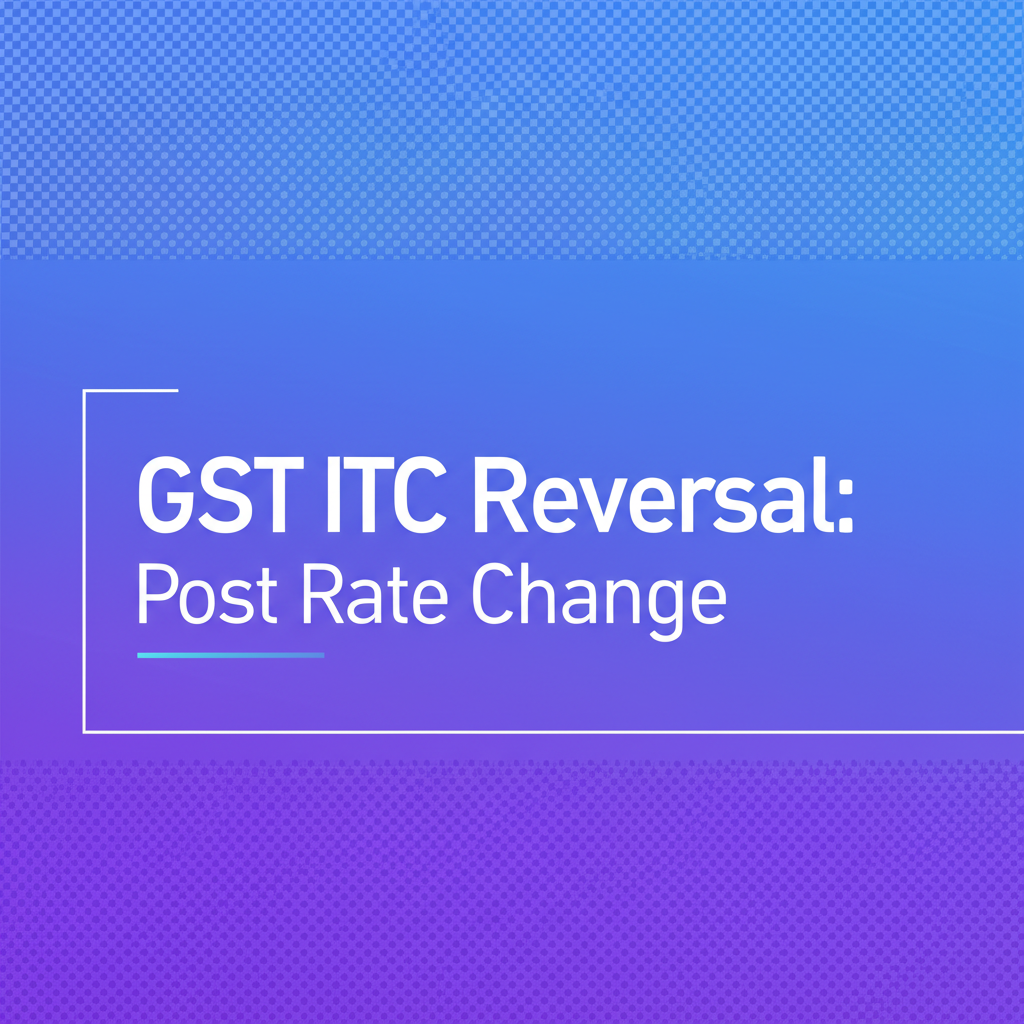ITC must be reversed after a GST rate change only in specific cases, as clarified by the decisions and FAQs related to the 56th GST Council meeting:
Cases When ITC Must Be Reversed
-
Supply Becomes Wholly Exempt: If the outward supply of goods/services becomes fully exempt after the rate change, all previously availed ITC on inputs, input services, and capital goods pertaining to those supplies must be reversed per section 18(4) of CGST Act.
-
Opting for Composition Scheme: If a registered person opts for the composition scheme after the rate change, all ITC availed on stock and capital goods is required to be reversed.
-
Transitional Stock of Exempted Goods: If stock in hand on the date of exemption consists of inputs or input services that became exempt due to the rate change, ITC attributable to these inputs/services must be reversed.
-
ITC wrongly availed: In cases where ITC was availed incorrectly (blocked credits, non-business use, non-payment within 180 days, etc.), reversal is required as per section 16(2), section 17(5), Rule 37, Rule 42, Rule 43, etc., regardless of the rate change.
-
Post-Sale Commercial Credit Notes: If discounts or commercial credit notes are issued but not supported by matching GST credit notes, related ITC may require adjustment based on Council clarifications.
A mere reduction in GST rate does not by itself trigger ITC reversal. Reversal is required only if the supply becomes exempt or other specific provisions are met. Taxpayers should carefully monitor the nature of their supply after rate changes to avoid compliance risks
जीएसटी दर परिवर्तन के बाद केवल विशिष्ट मामलों में ही आईटीसी को रिवर्स करना होगा, जैसा कि 56वीं जीएसटी परिषद की बैठक से संबंधित निर्णयों और FAQ द्वारा स्पष्ट किया गया है:
वे मामले जहाँ पूरी तरह से छूट प्राप्त आपूर्ति है, आईटीसी को रिवर्स करना होगा : यदि दर परिवर्तन के बाद वस्तुओं/सेवाओं की बाह्य आपूर्ति पूरी तरह से छूट प्राप्त हो जाती है, तो सीजीएसटी अधिनियम की धारा 18(4) के अनुसार उन आपूर्तियों से संबंधित इनपुट, इनपुट सेवाओं और पूंजीगत वस्तुओं पर पहले से प्राप्त सभी आईटीसी को रिवर्स करना होगा।
Composition Scheme का चयन: यदि कोई पंजीकृत व्यक्ति दर परिवर्तन के बाद Composition Scheme का चयन करता है, तो स्टॉक और पूंजीगत वस्तुओं पर प्राप्त सभी आईटीसी को रिवर्स करना आवश्यक है।
छूट प्राप्त वस्तुओं का संक्रमणकालीन(Transitional) स्टॉक: यदि छूट की तिथि को हाथ में स्टॉक में ऐसे इनपुट या इनपुट सेवाएँ हैं जो दर परिवर्तन के कारण छूट प्राप्त हो गए हैं, तो इन इनपुट/सेवाओं के कारण होने वाले आईटीसी को रिवर्स करना होगा।
गलत तरीके से प्राप्त आईटीसी: जिन मामलों में आईटीसी गलत तरीके से प्राप्त किया गया था (अवरुद्ध क्रेडिट, गैर-व्यावसायिक उपयोग, 180 दिनों के भीतर भुगतान न करना, आदि), धारा 16(2), धारा 17(5), नियम 37, नियम 42, नियम 43 आदि के अनुसार, दर परिवर्तन की परवाह किए बिना, रिवर्स करना आवश्यक है।
बिक्री के बाद वाणिज्यिक क्रेडिट नोट: यदि छूट या वाणिज्यिक क्रेडिट नोट जारी किए जाते हैं लेकिन मिलान जीएसटी क्रेडिट नोट द्वारा समर्थित नहीं हैं, तो संबंधित आईटीसी को परिषद के स्पष्टीकरण के आधार पर समायोजन की आवश्यकता हो सकती है।
जीएसटी दर में केवल कमी अपने आप में आईटीसी रिवर्सल को प्रेरित नहीं करती है। आईटीसी रिवर्सल केवल तभी आवश्यक है जब आपूर्ति छूट प्राप्त हो जाए या अन्य विशिष्ट प्रावधान पूरे हों। करदाताओं को अनुपालन जोखिमों (Compliance risks) से बचने के लिए दर परिवर्तन के बाद अपनी आपूर्ति की प्रकृति की सावधानीपूर्वक निगरानी(monitor) करनी चाहिए।


